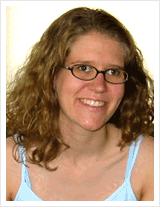 |
 |
True Confessions of a College-Finder Overachiever
‘The Other Stuff Just Doesn’t Matter’
|
|
By Juliana Pearson
|
 I’ve learned not to tell my friends and professors at Earlham how many colleges I visited as a high school student. They just look at me like I’m crazy. I don’t blame them, really. Thirty schools was a bit excessive. Most of the schools I visited were small liberal art schools: Middlebury in Vermont, Haverford and Swarthmore in Philadelphia, Macalester, Carleton, and Oberlin, and Grinnell, in the Midwest, to name just a few. I also visited and applied to William and Mary and UVa. I suppose I could think back on it as a wonderful excuse for a giant road trip that took me from Minnesota to Maine to Florida, in search of El Dorado, the perfect college for me. I’ve learned not to tell my friends and professors at Earlham how many colleges I visited as a high school student. They just look at me like I’m crazy. I don’t blame them, really. Thirty schools was a bit excessive. Most of the schools I visited were small liberal art schools: Middlebury in Vermont, Haverford and Swarthmore in Philadelphia, Macalester, Carleton, and Oberlin, and Grinnell, in the Midwest, to name just a few. I also visited and applied to William and Mary and UVa. I suppose I could think back on it as a wonderful excuse for a giant road trip that took me from Minnesota to Maine to Florida, in search of El Dorado, the perfect college for me.
The visits, however, are not the whole story. By the time I finished my college search, I could rattle off statistics about academic departments, student organizations, and scholarships at hundreds of schools. My parents joked that my knowledge would serve me well as a college consultant. I read every college guide that I could get my hands on. I was especially intrigued by authors like Loren Pope and Jay Matthews, who argued that high school seniors should disregard selectivity ratings and other status measures and look for a place where they would be really happy. In Colleges That Change Lives, Loren Pope profiles 40 small liberal art schools that “you should know about even if you’re not a straight-A student.” It’s a good book; you should check it out. I would lend you my copy, but the cover fell off.
By the time April of my senior year rolled around, I was so tired of searching and of statistics. I just wanted the process to be over. I got wait-listed at my first choice school, but for some reason was too impatient to stay on the list into the summer months. I wanted to know where I was going! I got a friendly acceptance letter from my second choice school, Macalester in Minnesota. I was about to send in the confirmation form when a small envelope arrived in my mailbox. Enclosed was a personal letter about my application from one of the admissions deans at UVa and an invitation to become an Echols Scholar there. The personal letter and the Echols honor excited me. Despite my intuition that UVa was not the right place for me (I hadn’t looked at or applied to any other large state university), their invitation was too enticing to pass up. After all, in addition to the prestige attached to being an Echols Scholar, I would have the privilege of being able to enroll in any courses I wanted to take throughout my undergraduate career. In spite of all this, the fit just wasn’t right and my intuition proved right..
Midway though my freshman year, I transferred to Earlham College, one of the small liberal art schools profiled in Colleges that Change Lives. I’m majoring in sociology and anthropology with a minor in creative writing. My advisor is amazing; he’s a sociologist who shares my strong interest in educational equity and alternative schools. I meet with him in his office every Wednesday morning to discuss my senior thesis and intriguing articles in The New York Times and The Wall Street Journal. Even though there aren’t as many resources (library books, mostly) on my tiny campus, I really couldn’t have asked for anything better.
Sometime during my senior year, Dr. DeFazio told my English class, “Really, it doesn’t matter where you go to school. You could get a good education in a library.” He’s right in the sense that college is what you make of it. It really doesn’t matter if a school is prestigious or has a stellar chemistry or English or basket-weaving department. Many college students change their majors multiple times. It does help to have an advisor at Earlham that shares my interests so closely; he has provided me with wonderful connections and resources. At the same time, my interests have been shaped by my professors at Earlham. There are great professors who want to help undergraduates at all colleges and universities. Even if you’re somewhere that seems completely impersonal, you can seek professors out. You, not the school you choose, are ultimately the factor that decides what kind of college experience you will have.
Still, there are some places where you will be happier than others. I certainly know that’s true. The bottom line is to choose a place where you can see yourself living happily for four years, a place where the people are friendly, and when you step on campus it feels like home. The other stuff just doesn’t matter.
|
|
|
 |
|
 |
 |